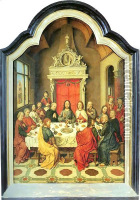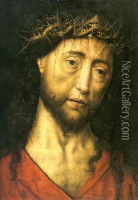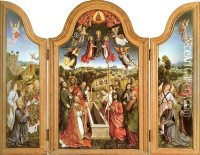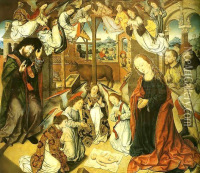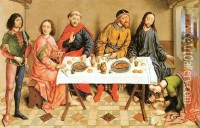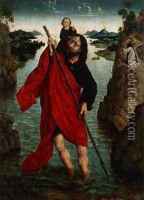Aelbrecht Bouts Paintings
Aelbrecht Bouts was a Flemish painter, known for his contribution to early Northern Renaissance art. Born in the mid-15th century, he was the second son of the prominent painter Dieric Bouts the Elder, who greatly influenced Aelbrecht's style and technique. His father was a well-known artist in Leuven, which was part of the Duchy of Brabant (now present-day Belgium). Aelbrecht likely received his initial training in his father's workshop and absorbed the artistic traditions of the time, which included a strong emphasis on detail and a devotion to depicting religious subjects with emotional depth.
Aelbrecht's work is characterized by its serene and contemplative nature, often focusing on religious themes. He was particularly skilled in the use of color and light, which added a sense of softness and spirituality to his paintings. His altarpieces and devotional works were sought after for their ability to inspire piety and meditation.
Following his father's death in 1475, Aelbrecht took over the family workshop. He continued to work in Leuven and became a respected master in his own right. His style, however, remained deeply influenced by his father's approach, which can make it challenging at times to distinguish between their works. Aelbrecht's sons, Dieric Bouts the Younger and Aert Bouts, also became painters, maintaining the family's artistic legacy.
Although Aelbrecht Bouts was less innovative than his father and did not achieve the same level of fame, he played an essential role in the continuation of the Bouts family's artistic tradition and contributed to the Northern Renaissance through his own works. Some of his notable works include 'The Martyrdom of St. Erasmus' and 'The Last Supper,' which exhibit his commitment to the representation of religious narratives with clarity and emotive power.
Throughout his career, Aelbrecht Bouts remained active in Leuven until his death in 1549, leaving behind a body of work that continues to be appreciated for its quiet beauty and devotional character.





